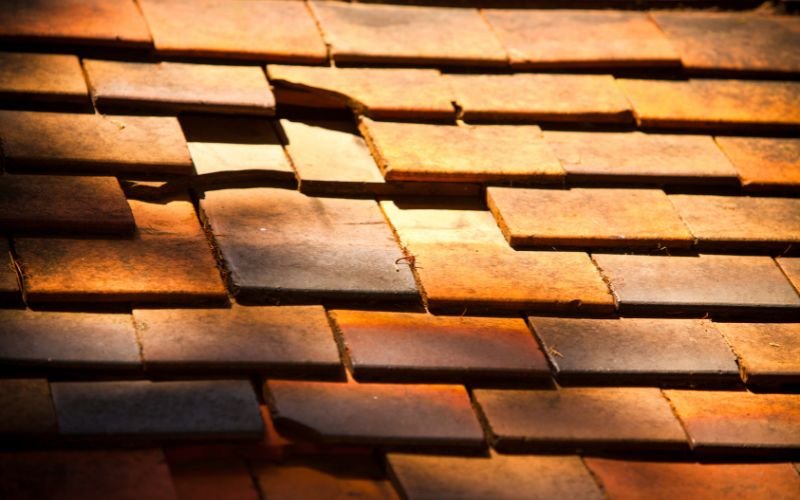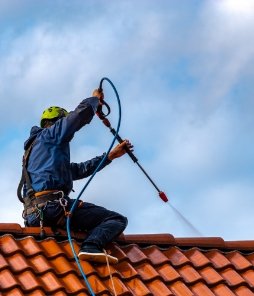
In a city like Melbourne—where weather conditions vary from sweltering summers to severe rain—maintaining your tile roof in good shape is crucial as your roof is your home’s first line of defence against the elements. With time, tile roofs can develop problems like cracked tiles, moss growth, or water leaks, all of which, if ignored, could result in expensive repairs or perhaps complete roof replacements.
Knowing the main warning signs of roof damage will enable you to act quickly and prolong the life of your roof. This all-encompassing book will cover the necessary indicators that your tiled roof requires restoration, the restoration technique, and professional maintenance advice to keep your roof in best condition.
Why Tile Roof Restoration is Essential

The Role of Roof Tiles in Protecting Your Home
Renowned for their lifetime, visual attractiveness, and toughness, tile roofs are Yet, ongoing weather exposure could eventually wear down even the toughest roofing materials. Roof tiles mostly provide the following functions:
- Weather Protection: Shielding your home from strong UV rays, wind, and rain.
- Thermal Insulation: Helping to improve energy efficiency and indoor temperature control.
- Structural Integrity: Preventing damage to the underlying roof structure and water leaks.
How Melbourne’s Weather Conditions Impact Tile Roofs
The weather in Melbourne offers special difficulties for tile roofs:
| Weather Condition | Impact on Tile Roof |
| Heavy Rainfall | Increased risk of leaks and water damage. |
| High Humidity | Encourages moss and mould growth on tiles. |
| Strong Winds | Can dislodge loose tiles, leading to structural weaknesses. |
| Extreme Heat | Causes tiles to expand and contract, leading to cracks. |
Every Melbourne home has to have regular inspections and quick repairs since neglecting little roof issues can quickly cause significant damage.
Key Signs Your Tiled Roof Needs Restoration
1. Cracked, Broken, or Loose Tiles
Tiles protect the roof from moisture damage; when they break or become loose, water can flow through, causing leaks, wood rot, and inadequate insulation. Look for missing or damaged tiles on your roof often and fix them immediately. If you’re considering professional help, Hawthorn roof restoration services can ensure a thorough inspection and quality repairs.

2. Leaking Roof or Water Stains
Water stains on ceilings, damp patches on walls, or maybe mould growth inside the house could all be signs of leaks. Leaks often result from damaged roof bedding, broken tiles, or improperly sealed flashing.
3. Moss, Mould, and Algae Growth
Melbourne’s humid climate can encourage moss, mould, and algae growth on tile roofs. Though they may seem tiny cosmetic issues, these can cause tiles to retain moisture, hence hastening deterioration and perhaps creating leaks.
4. Sagging Roof Structure
Under the tiles, a sagging roofline indicates structural deterioration. This could result from water accumulation, damaged beams, or age-related uneven weight distribution. If you notice any roofline dips, call a professional immediately.
5. Deteriorating Roof Bedding and Pointing
The pointing and bedding keep the ridge capping in position, closing holes and stopping water from leaking through. With time, this mortar can deteriorate and break, requiring rebedding and repointing to preserve roof integrity.

6. Blocked or Damaged Gutters
Gutters are quite crucial for directing rainfall away from your home. Blocked or broken gutters can lead to water overflow, which would damage tiles and let moisture into the roof structure.
7. Excessive Roof Dust and Debris in Gutters
A buildup of debris and dust in gutters is one common but overlooked sign of tile roof degradation. This indicates tile surface deterioration, which eventually could compromise its strength and weather resistance. If you notice these signs, considering roof repairs in Ferntree Gully can help maintain your roof’s longevity and performance.
8. Increased Energy Bills
Your roof insulation may be damaged if your energy costs have risen sharply. Damaged tiles let heat and cold air escape, so forcing your HVAC system to work more to keep inside temperatures.
When to Repair vs. When to Replace Your Tile Roof
The degree of the damage will help you decide whether to fix or replace your tile roof. Here’s a quick comparison:
| Factor | Roof Repair | Roof Replacement |
| Damage Severity | Minor cracks, loose tiles | Large-scale structural damage |
| Cost | More affordable | Higher investment |
| Lifespan Extension | 5–10 years | 30+ years |
| Time Required | 1–3 days | 1–2 weeks |
A complete replacement could be a more reasonably long-term option if your roof is more than 20–25 years old and calls for regular maintenance.
The Tile Roof Restoration Process
Step 1: Initial Roof Inspection
Broken tiles, worn-out bedding, and water damage are among the problems found after a comprehensive evaluation.
Step 2: High-Pressure Roof Cleaning
Preparing the roof for restoration calls for a high-pressure wash removing dirt, moss, and debris.

Step 3: Tile Replacement
To guarantee consistent protection, any cracked, broken, or missing tiles are replaced.
Step 4: Rebedding and Repointing
Ridge caps are fastened and gaps sealed by removing and replacing old mortar.
Step 5: Protective Coating Application
To shield tiles from more harm and increase their lifetime, a weather-resistant sealer is used.
Preventative Maintenance Tips to Extend Roof Lifespan
Regular Roof Inspections
Inspect at least twice a year to find early indicators of damage.
Keep Gutters Clean
Removing garbage and leaves stops roof damage and water buildup.

Apply Protective Coatings
Sealants increase tile life and aid to prevent water penetration.
Address Small Issues Promptly
Early fix of small cracks and leaks prevents costly later repairs.
Conclusion
Your home is protected mostly by your tiled roof. Early identification of warning signals and quick action may help you save money and avoid major structural damage. From little repairs to complete roof restoration in Ferntree Gully, spending on professional services guarantees long-term durability and peace of mind.
Schedule a roof inspection in Melbourne today with Eufouria to maintain your roof in top shape; don’t wait until it’s too late!
-
December 19,2025
How Gutter Pitch Errors Lead to Roof Valley Damage
-
November 27,2025
How to Spot a Dodgy Roof Quote in Melbourne
-
November 13,2025
Maintenance Tips for Slatted Roof Systems in Melbourne
-
October 30,2025
Colour & Style Trends for Roofing in Melbourne
-
October 7,2025
How to Prevent & Fix Flat Roof Leaks in Melbourne
-
September 29,2025
Role Of Ember Attack In Roof Ignition & How To Prevent It
-
September 16,2025
Roof Ventilation and Repairs: Why Melbourne Homes Overheat
-
August 19,2025
Roof Leak or Plumbing Leak? How to Tell the Difference in Homes
-
August 4,2025
Gutter and Roof Safety Tips Before Bushfire Season in Victoria
-
July 18,2025
The Ultimate Roof & Gutter Maintenance Checklist for Melbourne Homeowners
-
July 9,2025
Guide to Roof Tile Types in Australia and How to Repair Them
-
June 26,2025
Metal vs. Asphalt: Which Roofing Material Lasts Longer?
-
June 6,2025
Drones in Roofing: How We Inspect Roofs Safely and Quickly in Melbourne
-
May 14,2025
5 Common Roof Problems in Coastal Areas (and How to Prevent Them)
-
April 16,2025
Dealing with Gutter Blockages During Melbourne’s Rainy Season: Repair Tips & Tricks
-
March 7,2025
How to Get Your House Ready for Roof Restoration
-
February 28,2025
Why Is Your Roof Paint Peeling? Top Causes and Solutions
-
February 10,2025
The Importance of Roof Inspections Before Buying a Home in Melbourne
-
January 15,2025
Heat-Reflective Roof Restoration Coatings Lower Energy Bills
-
January 9,2025
The Hidden Dangers of Roof Mould: How It Affects Your Home and Health
-
December 26,2024
Why Melbourne’s Summer Is the Ideal Season for Roof Restoration
-
December 17,2024
Rooftops Around the World: Comparative Analysis With Australia’s Superior Guidelines
-
November 25,2024
Why Gutter Cleaning in Melbourne is Crucial Before the Winter Season
-
October 19,2024
Common Roof Problems in Melbourne: Causes and Effective Solutions
-
September 30,2024
Roof Repair Signs: What Every Melbourne Homeowner Should Know
-
September 23,2024
Tips to Maintain and Extend the Life of Your Restored Roof in Melbourne
-
August 26,2024
The Complete Guide for Roof Inspections and Restorations
-
August 12,2024
Restoration vs. Repairs: Choose the Right One for Your Home






























